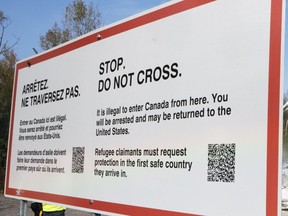
As provincial premiers wrapped up their July meeting in Halifax, Quebec Premier Francois Legault said provinces agreed they could do more to redistribute asylum seekers from Quebec. Discussion around redistribution should also consider how to make federal funding to the provinces more responsive in the face of increased claimants, interprovincial migration and increased overall immigration.
According to Immigration and Refugee Board of Canada data, there was a year-over-year increase of 128 per cent in asylum claims, 140,000 total, from 2022 to 2023. Quebec invoiced the federal government $1 billion in February as the province said it had taken a disproportionate share of asylum seekers compared to the rest of the country. The federal government agreed to pay a $750-million top-up. This number is not insignificant — the entire settlement budget for all forms of immigration in 2022-23, not just asylum seekers, was $839.2 million for all of Canada outside of Quebec.
When the top-up was announced, B.C. Premier David Eby expressed his frustration that the western provinces had not similarly received extra funding. While Eby was talking about temporary immigrants, his argument can also be applied to asylum seekers. Manitoba Premier Wab Kinew said his province would take more asylum seekers if federal funding followed. These views are backed by data that show the unfairness of federal funding to western provinces, as funds have lagged growth.
Immigration, Refugees and Citizenship Canada (IRCC) data shows that while Quebec took in 64 per cent of all asylum seekers to Canada in fiscal year 2022 and 46 per cent in 2023, they lost about 28 per cent to interprovincial migration. Their total share of asylum seekers in 2022 was 48 per cent, and 35 per cent in 2023. At the same time, the western provinces also experienced an increase in asylum seekers at their own ports of entry and through interprovincial migration.
Budgeting for asylum seekers is particularly challenging as governments do not know how many individuals are going to apply on a yearly basis. These individuals are often fleeing unsafe conditions for political or humanitarian reasons and have had little time to prepare to leave compared to those admitted through other streams, such as economic or family reunification.
While other immigration applications begin abroad, asylum seekers begin the process when they arrive at a port of entry or are already in Canada. While they wait to hear if they will receive formal refugee status and permanent residency, asylum seekers can work and access services, but may need language or credential assessment and training before they can enter the workforce. Individuals coming from traumatic circumstances may also need counselling or mental-health support. And provinces need to adjust service delivery to reflect these complex and important needs, which is an additional cost.
Interprovincial migration of newcomers amplifies the problem as settlement funding doesn’t follow the individual. The Canada West Foundation estimates that between 2016 and 2021, newcomers comprised 65 per cent of Quebec’s net outflow of interprovincial migrants. It is reasonable to expect that a proportion of these newcomers then accessed services in another province, for which that province may not have received federal support.
A phased funding approach could be one way to address this challenge. In the immediate term, the federal government could provide funds to the provinces to address their service backlogs and increased demand for immigration services. Additional funds could then be provided to support expanding or developing new services to reflect the needs of a growing asylum-seeker population. At the same time, the provinces and federal government could collaborate to build a long-term asylum strategy.
Central to these discussions should be the mutual recognition that newcomers to the country — regardless of how they arrived, where they land or ultimately choose to settle — should receive timely and holistic services so they can begin to build roots in their new home.
To treat them otherwise is unfair to those we encourage to come to Canada.
Gary Mar is president and CEO of the Canada West Foundation. Stephany Laverty is a senior policy analyst at the Canada West Foundation.